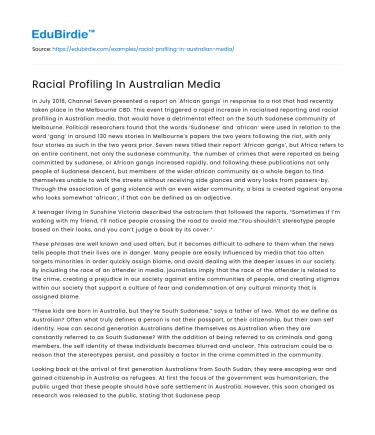In July 2018, Channel Seven presented a report on 'African gangs' in response to a riot that had recently taken place in the Melbourne CBD. This event triggered a rapid increase in racialised reporting and racial profiling in Australian media, that would have a detrimental effect on the South Sudanese community of Melbourne. Political researchers found that the words ‘Sudanese’ and ‘african’ were used in relation to the word ‘gang’ in around 130 news stories in Melbourne’s papers the two years following the riot, with only four stories as such in the two years prior. Seven news titled their report ‘African gangs’, but Africa refers to an entire continent, not only the sudanese community. The number of crimes that were reported as being committed by sudanese, or African gangs increased rapidly, and following these publications not only people of Sudanese descent, but members of the wider african community as a whole began to find themselves unable to walk the streets without receiving side glances and wary looks from passers-by. Through the association of gang violence with an even wider community, a bias is created against anyone who looks somewhat ‘african’, if that can be defined as an adjective.
A teenager living in Sunshine Victoria described the ostracism that followed the reports, “Sometimes if I’m walking with my friend, I’ll notice people crossing the road to avoid me.“You shouldn’t stereotype people based on their looks, and you can’t judge a book by its cover.”
Save your time!
We can take care of your essay
- Proper editing and formatting
- Free revision, title page, and bibliography
- Flexible prices and money-back guarantee
These phrases are well known and used often, but it becomes difficult to adhere to them when the news tells people that their lives are in danger. Many people are easily influenced by media that too often targets minorities in order quickly assign blame, and avoid dealing with the deeper issues in our society. By including the race of an offender in media, journalists imply that the race of the offender is related to the crime, creating a prejudice in our society against entire communities of people, and creating stigmas within our society that support a culture of fear and condemnation of any cultural minority that is assigned blame.
“These kids are born in Australia, but they’re South Sudanese,” says a father of two. What do we define as Australian? Often what truly defines a person is not their passport, or their citizenship, but their own self identity. How can second generation Australians define themselves as Australian when they are constantly referred to as South Sudanese? With the addition of being referred to as criminals and gang members, the self identity of these individuals becomes blurred and unclear. This ostracism could be a reason that the stereotypes persist, and possibly a factor in the crime committed in the community.
Looking back at the arrival of first generation Australians from South Sudan, they were escaping war and gained citizenship in Australia as refugees. At first the focus of the government was humanitarian, the public urged that these people should have safe settlement in Australia. However, this soon changed as research was released to the public, stating that Sudanese people had low IQ and were therefore more prone to crime. At the same time, the number of crimes being reported as committed by Sudanese people increased, along with the labelling and stereotyping, the assumption that Africans were more prone to crime than other cultural groups grew virulent.
Although the level of education of these first generation Australians was much lower than other groups of refugees, the causes of crime are numerous and complex. The factor of socioeconomic status plays a large role as a cause of crime, and is not exclusive to immigrants, and immigrant children. Looking at the treatment of another minority group, Muslims in Australia have faced similar ostracism, stereotyping, demonisation, and isolation. Terrorist attacks by radicalists in Australia, and all over the world led to the fear and distrust of Muslim Australians.






 Stuck on your essay?
Stuck on your essay?

